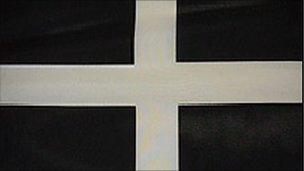Cornish language no longer extinct, says UN
- Published

About 300 people speak Cornish fluently
The Cornish language, which had been branded extinct by linguistic experts, has been reclassified as "critically endangered" instead.
The new definition is included in the latest edition of the , compiled by the United Nations group Unesco.
The atlas's authors said the earlier definition was not a "true reflection" of the language's status.
The change has been welcomed by the Cornish Language Partnership (CLP).
The atlas entry for Cornwall now states: "Unesco is pleased to acknowledge that the term 'extinct' does not reflect the current situation for Cornish.
"This language is now classified as "critically endangered" and identified as being in process of revitalization."
The atlas is designed to highlight awareness of languages in danger around the world and was compiled by 30 linguists.
The "critically endangered" category is a new one.
Jenefer Lowe, from CLP, said: "The problem was that the atlas didn't have a category for us before.
"We're pleased that Unesco has recognised that people are speaking and using the language now."
"It validates the fact that good work is going on."
Cornish is believed to have died out as a first language in 1777.
Ms Lowe said there were now about 300 fluent speakers but "an awful lot more people than that" had a "smattering" of the language.
It is taught in a number of schools and is becoming increasingly popular for wedding speeches, house names and tattoos, according to CLP.